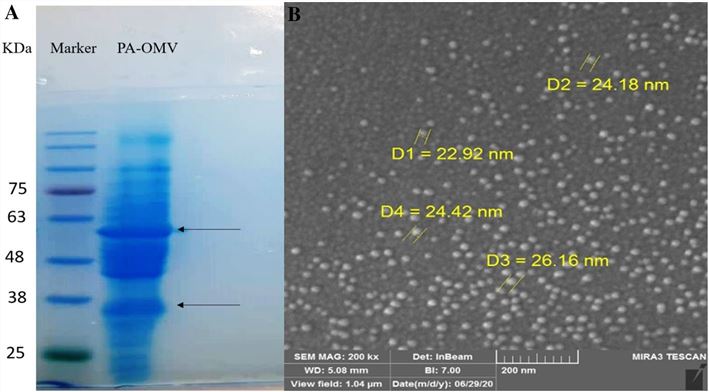Pseudomonas aeruginosa-derived Exosome Research and Application
Pseudomonas aeruginosa is a widely distributed and highly pathogenic Gram-negative bacillus. In hospital environments, it often becomes the culprit of various severe infections, especially in burn patients, cystic fibrosis patients, and those with compromised immune systems. Numerous studies have revealed that the exosomes released by this bacterium play multiple roles in its pathogenic mechanisms. To provide researchers with deeper insights, Creative Biolabs has summarized and envisioned the related research on exosomes derived from Pseudomonas aeruginosa for clients.
Exosomes Derived from Pseudomonas aeruginosa: A Key Role in Pathogenicity
Recent research has disclosed various functions of exosomes from Pseudomonas aeruginosa in its pathogenic processes:
1. Exosomes released by Pseudomonas aeruginosa facilitate bacterial adhesion and biofilm formation, thereby enhancing its colonization capability within the host.
2. Various toxic molecules contained in these exosomes cause harm to host cells, thereby accelerating the spread of infection.
3. Exosomes from Pseudomonas aeruginosa may also act as baits for bacteriophages, providing bacteria with a protective barrier against phage attacks.
These key findings offer insights into exploring new treatment strategies.
 Fig.1 Characterization of PA-OMVs isolated from Pseudomonas aeruginosa.1,2
Fig.1 Characterization of PA-OMVs isolated from Pseudomonas aeruginosa.1,2
Exosomes Derived from Pseudomonas aeruginosa as a Novel Therapeutic Strategy
-
Immunoprevention and Vaccine Development: Exosomes derived from Pseudomonas aeruginosa contain antigens capable of inducing protective immune responses, and are considered a promising avenue for developing vaccines against Pseudomonas aeruginosa. Additionally, certain antibiotic treatments can increase the release of exosomes from Pseudomonas aeruginosa, and these exosomes can activate stronger humoral and cellular immune responses. For example, studies have found that by combining exosomes from Pseudomonas aeruginosa with diphtheria toxin, the specific antibody titers can be significantly increased, displaying better protective effects in a mouse burn model by reducing bacterial load and inflammatory cell infiltration.2
-
Antibody-mediated Therapy: The immunogenicity of exosomes derived from Pseudomonas aeruginosa is believed to be useful for developing therapeutic monoclonal antibodies. Targeting antigens within exosomes may aid in developing new antibody drugs to combat infections by Pseudomonas aeruginosa.
-
Anti-phage Defense: Exosomes derived from Pseudomonas aeruginosa exhibit passive antibody resistance against Pseudomonas aeruginosa, being able to adsorb phages, thus protecting the bacteria from phage invasion.3 Research on key targets in this defense mechanism may aid in the development of new phage therapies.
-
Immune Evasion and Host Response Modulation: By affecting the host's immune response, such as inhibiting the expression of MHC molecules in human alveolar macrophages, exosomes derived from Pseudomonas aeruginosa may contribute to reducing pathogen clearance and chronic infection occurrences.4 Moreover, exosomes derived from Pseudomonas aeruginosa can also suppress allergic responses by inducing Treg cell reactions, possibly providing new insights into preventing allergic diseases.5
In summary, exosomes derived from Pseudomonas aeruginosa demonstrate tremendous research and application potential. These small vesicles hold significant value in areas like antimicrobial resistance, immune modulation, and vaccine development. As a global leader in exosome technology services, Creative Biolabs possesses extensive experience and advanced technical capabilities, aiming to provide customized solutions for innovative bacterial-derived exosome research needs. If you are interested in our services or need more information, feel free to contact us.
Bacteria-derived Exosome Isolation and Identification
In Vitro Functional Discovery of Bacteria-derived Exosomes
In Vivo Functional Discovery of Bacteria-derived Exosomes
References
-
Zare Banadkoki, E.; et al. Pseudomonas aeruginosa PAO1 outer membrane vesicles-diphtheria toxoid conjugate as a vaccine candidate in a murine burn model. Scientific Reports. 2022, 12(1):22324.
-
under Open Access license CC BY 4.0, without modification.
For Research Use Only. Cannot be used by patients.
Related Services:

 Fig.1 Characterization of PA-OMVs isolated from Pseudomonas aeruginosa.1,2
Fig.1 Characterization of PA-OMVs isolated from Pseudomonas aeruginosa.1,2








